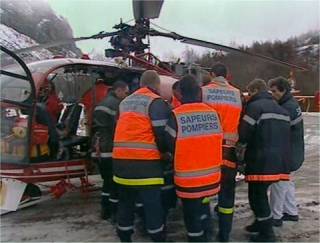British skiers have long complained about sharp practices by ski resort rescue services: holding skis hostage, asking for credit cards from injured skiers, haggling over ski insurance unless it is the Carre Neige policy sold with the lift pass. First a recap on why you need insurance. If you are ski touring outside of ski domains the rescue is handled by the emergency services including specialist police units (PGHM, PGM, CRS) and fire brigade (GRIMP, GREP) backed up by the helicopters of the sSécurité Civile. The tab is picked up by the French tax payer. You will still need insurance to cover hospital costs as the French state system, and hence other European systems, only cover around 75% of hospital bills.
The situation in ski resorts is a special case and responsibility has been delegated to the mayor. He must set up a system for rescuing stranded skiers, whether on or off the marked ski runs. Tariffs can range from 250 euros for a stretcher to the bottom of the slopes to 1000s of euros for a helicopter rescue. The ski domain is normally defined as any point that can be reached by gravity from the top of the ski lifts, although in practice it will normally extend up to any ridgelines.
The Dauphine Libere newspaper has carried out an investigation into some even sharper practices in the ski resort of les Arcs. Mark Riches, from Surrey in the United Kingdom has an accident on a blue run on the 14th of January. The stretcher ride to the bottom of the run cost 286 €, so far so good. According to the DL the piste patrol told him there was no doctor in Arc 1800 (a PH.com member has used the doctor there so this is obviously not true). From here the bills started to add up: 220 € for the one-way ambulance ride to Arc 1600, x-ray 122 €, taxi back to 1800 52 €. Mr Riches was fuming when he saw what he would have to pay. According to the Doctor at Arc 1800 Mr Riches isn’t the only case. Dr. François Gazave, the mayor of Bourg Saint Maurice, who has excluded the doctor from the list of medical practises in the ski area. However Dr Gazave says the situation is complex and the commune had to rationalize the number of doctors used by the rescue services in order to control costs.
This isn’t the only complaint we have heard. A member of the French rescue services told us that they often rescue skiers inside ski domains rather than the piste patrol. Particularly for complex operations where the knowledge of their highly trained staff is essential. There is no cost to the ski resort but rescued skiers will still usually be billed by the resort as if rescued by the piste patrol. More recently communes have been trying to pass on the costs of “backcountry rescue” to skiers where the town hall has had to put in place extra resources to help the state rescue services. An example would be hiring a private helicopter for search operations. However these costs are always picked up at a departmental level by the SDIS (Service départemental d’Incendie et de secours).
It can be argued that resorts and communes may not have the accounting systems in place to break down rescue costs and that an individuals insurer should pay rather than tax payers where possible. However this can lead to the case last year where families of dead avalanche victims were presented with a bill for the search and rescue.
The title should read “French practices...”, not “Spanish”? But now you’ve got me thinking: does anyone have good information on corresponding practices in Spain, Italy and Switzerland?
Posted by on Thursday, 15 February, 2007 at 08:03 AM
Me apena tener que leer ese título insultando a los españoles. que yo sepa, aquí no se cobran estas barbaridades, algo que si hacen en los Alpes.
Posted by on Thursday, 15 February, 2007 at 05:39 PM
The term “spanish practices” is in use in British English and means unauthorised working methods which benefit the parties concerned. The Spanish Embassy complained when the BBC used the term to described working practices at British Airways, so it is a poorly viewed term down on the peninsula.
Posted by Picos on Thursday, 15 February, 2007 at 06:01 PM
Thank-you for the explaination. Apolgies to Juan and other readers. The term is in quite widespread use but is obviously not liked by Spanish and other people. We will try harder in future.
Posted by
davidof on Thursday, 15 February, 2007 at 11:33 PM
I can’t see why these would be termed as ‘sharp practice’. Provided receipts are retained most of the costs can be reclaimed from the insurance company - that is why insurance is important and the level of costs reimbursed down to the policy.
Imagaine a french pisteur trying to claim back from an english company or any other country.
They don’t have the time, the staff, the expertise, the language skills or the accounting procedures.
A further complication is that in France only docters are allowed to prescribe pain killers. Hence in extreme cases helicopters are called so that doctors can be transported to the scene of the accident - it’s not just ot get the victim off the mountain.
Posted by on Friday, 16 February, 2007 at 12:50 PM
Page 1 of 1 pages

